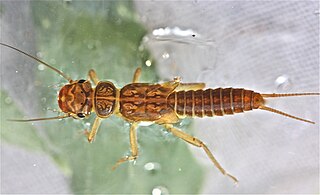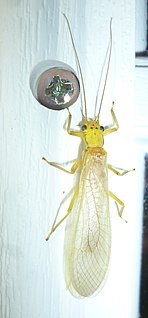
The Capniidae, the small winter stoneflies, are a family of insects in the stonefly order (Plecoptera). It constitutes one of the largest stonefly families, containing some 300 species distributed throughout the holarctic. Their closest relatives are the rolled-winged stoneflies (Leuctridae).
Ostrocerca truncata, the truncate forestfly, is a species of spring stonefly in the family Nemouridae. It is found in North America.
Zapada columbiana is a species in the family Nemouridae, in the order Plecoptera ("stoneflies"). The species is known generally as the "Columbian forestfly". It is found in North America.
Paracapnia opis, the northeastern snowfly, is a species of small winter stonefly in the family Capniidae. It is found in North America. Described by Edward Newman in 1839, it was the first known insect in the genus Paracapnia. It is synonymous with Paracapnia curvata.
Paracapnia is a genus of small winter stoneflies in the family Capniidae. There are about five described species in Paracapnia. They are native to North America.
Pteronarcys biloba, the knobbed salmonfly, is a species of giant stonefly in the family Pteronarcyidae. It is found in North America.
Eucapnopsis is a genus of small winter stoneflies in the family Capniidae. There are at least 2 described species in Eucapnopsis.

Taeniopteryx burksi, the eastern willowfly, is a species of winter stonefly in the family Taeniopterygidae. It is found in North America.
Allocapnia maria, the two-knobbed snowfly, is a species of small winter stonefly in the family Capniidae. It is found in North America.
Amphinemura linda is a species of spring stonefly in the family Nemouridae. It is found in North America.

Amphinemura is a genus of spring stoneflies in the family Nemouridae. There are about 18 described species in Amphinemura.
Isoperla bilineata, the two-lined stripetail, is a species of green-winged stonefly in the family Perlodidae. It is found in North America.
Skwala americana, the American springfly, is a species of springfly in the family Perlodidae. It is found in North America.

Pteronarcys princeps, the ebony salmonfly, is a species of giant stonefly in the family Pteronarcyidae. It is found in North America.

Isoperla similis, the black stripetail, is a species of green-winged stonefly in the family Perlodidae. It is found in North America.

Paragnetina fumosa, the smoky stone, is a species of common stonefly in the family Perlidae. It is found in North America.

Acroneuriinae is a subfamily of common stoneflies in the family Perlidae. There are about 32 genera and about 520 described species in Acroneuriinae.
Ostrocerca is a genus of spring stoneflies in the family Nemouridae. There are about six described species in Ostrocerca.

Agnetina annulipes, the southern stone, is a species of common stonefly in the family Perlidae. It is found in North America.

Eccoptura is a genus of common stoneflies in the family Perlidae. There is at least one described species in Eccoptura, E. xanthenes. It is known as the "yellow stone" and is found in North America.








